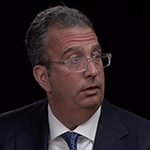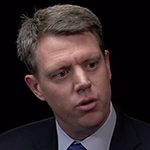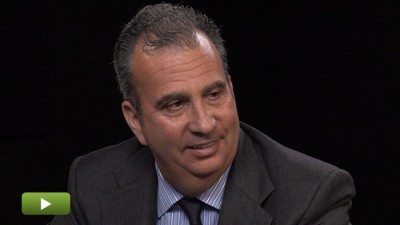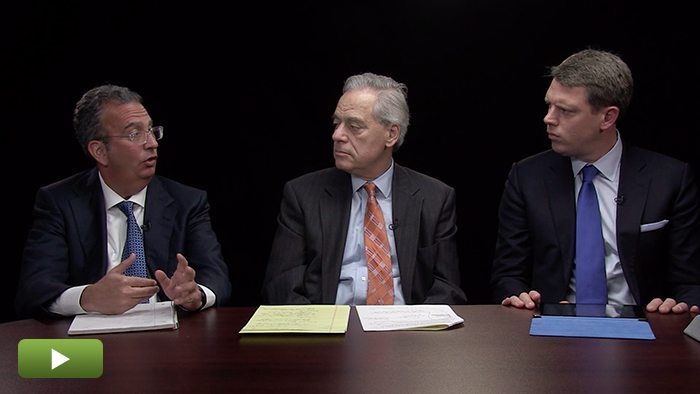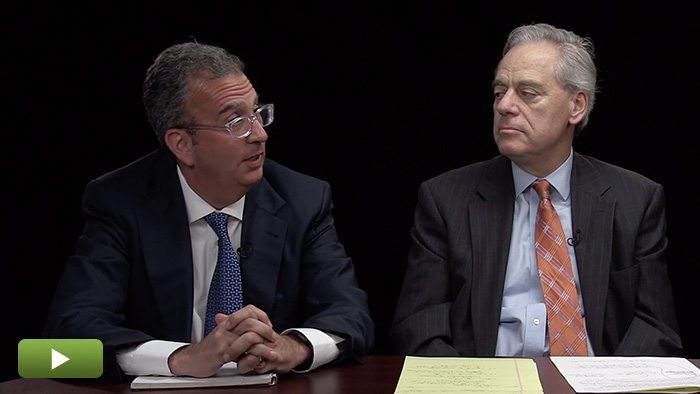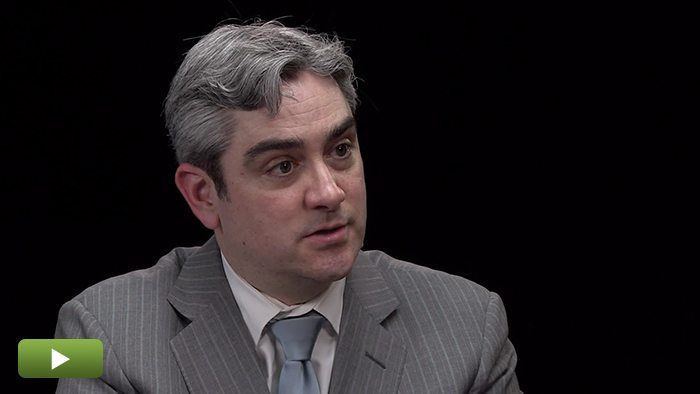Why LPs Have Questions About Your Back Office
Limited partners are increasingly interested in seeing evidence of strong back-office infrastructure, robust information, and best practices, according to experts from MatlinPatterson, Castle Harlan and Gen II Fund Services. Are the rigors and complexity of the mutual-fund industry in private equity’s future?
Transcript Download Transcript
Why LPs Have Questions About Your Back Office
Building a Better PE Firm
David Snow, Privcap: We’re joined today by Steve Millner of Gen II Fund Services, Howard Weiss of Castle Harlan, and Cameron Hillyer of MatlinPatterson. Gentlemen, welcome to Privcap. Thanks for being here.
We are talking about the growing importance of LP awareness of the back office and all the functions that feed into the back office. Though people didn’t have too many questions 10 or 15 years ago, now, according to all of you, they have a lot of questions and GPs should have the right answers to these questions.
Why don’t we talk about that? Let’s start with a question for Cameron: at your firm, MatlinPatterson, what are some signs you’re seeing that LPs are increasingly interested and, obviously, returns come first, but after that, the infrastructure that helps the firm run efficiently?
Cameron Hillyer, MatlinPatterson Global Advisers: The growth in the alternatives business in itself and couple that with much more regulation, it’s forcing GPs to upgrade and re-contemplate their entire operating infrastructure. You point out correctly that returns are still the top consideration, but other considerations—like the infrastructure, culture, governance and transparency—are no longer purely secondary considerations.
Snow: Howard, at your firm, have you seen LPs express greater interest in wanting to be up to date on what you’re doing and what your team is doing as the CFO?
Howard Weiss, Castle Harlan: The answer is yes, but they do it by asking us for information and more information and every kind of information you could possibly want. Part of it is also matching our information to what they have. They are concerned, as Cameron mentioned, about returns and, often, they’ll challenge us in terms of what we’ve issued. We have this tendency to try to get their information and ask them to allow us to go through and we match everything up to show them exactly what the issue might be.
I can’t say they’re going to call us and say, “What software program are you using?” but they want to know what their capital accounts look like, they want to know their waterfalls and their IRRs; that’s how they learn what goes on in our back office.
Snow: Steve, you oversee the back office on an outsource basis for many GP clients. Have you noticed an increasing interest among investors in particular about the integrity of those systems? Do they come to you and try to get information from you?
Steven Millner, Gen II Fund Services: It’s quite interesting. We had a different perspective, as being the third party provider in the back office. If we get questions, they’re only about the back office and not about the investment philosophy or returns. We’ve been doing this for the better part of 20 years. What’s really interesting, especially over the last five years, for the first 15 years, an LP never… visited our offices.
In the last five years, we have a steady stream of LPs coming to our offices. They want to look around, make sure we have the right disaster recovery plan and business continuity plan, that there’s really an office there. They want to view us. We’ve established a whole due-diligence binder where they look at our processes, our controls. This is something that’s much more recent, in the last five years. We have a steady stream, especially when our clients are out marketing a fund as part of operational due diligence. We’re getting paid site visits.
The other thing we’re seeing (again, more associated with the fundraising effort) is the questionnaires and due diligence the perspective LPs are placing on the GPs. Part of that now is a couple of pages about back-office stuff: business continuity, disaster recovery, escalation policies, etc. We’re asked on behalf of our clients to complete those sections of the questionnaires. That’s something new that we didn’t see 10 years ago. We didn’t see that type of thing occur.
Snow: Cameron, in talking about due diligence and questionnaires, have you noticed at your firm that those categories that, five to 10 years ago, no one was paying attention to are now things you’re having to fill out a form for?
Hillyer: I really have seen two major changes over the past few years. We talked earlier about the hedge fund side leading the charge there, but we’re seeing more of this on the private equity side.
First, you have a lot more people who are dedicated, operational due-diligence people. There used to be just one team that would cover everything. They would do the investment returns and ask the back office a couple of questions. Now, you’ve got dedicated people who are very experienced in that regard and they get to play off best practices of what’s appropriate for a firm of a particular size.
Second, you’re seeing things like ILPA trying to bring out best practices around DDQs. I wouldn’t say there’s widespread adoption of that in the industry, at this point, but it’s a slowly evolving process that people are moving to that standardization that makes everything efficient for everyone.
Snow: What would an experienced investor or someone advising an investor discover about the infrastructure of a firm that would raise a red flag or cause them to worry? What would be delinquent or missing that would cause concern?
Weiss: The inability to answer a question. They’re going to request certain information and your responsiveness, your accuracy, your understanding, and your ability to communicate it is going to tell them a lot. Will they decide to try to find out how you did it? I don’t think they’re as concerned about that as they are about the information they’re learning.
Millner: Primarily, an LP wants to have confidence that the information they’re getting is reliable and accurate and timely, because they have their own constituency, their own stakeholders they need to report to, whether they’re an endowment or a pension plan.
I’ll give you one example, anecdotally. I was invited in on behalf of a client to sit in on a due-diligence meeting operationally at the client’s offices. They went through their checklist and one question they asked the CFO was, “Who can sign off on moving money, wiring money?” In our organization, we tee things up for execution but we don’t have signatory authority. In this particular case, the CFO could wire any amount of money without another signature. The LP said, “We require two signatures over a certain amount of money in order for us to invest.” In that particular instance, the LP was actually mandating that the GP would have to modify their processes in order to accept the investment.
Hillyer: Steve, I think your example there is a testament to the fact that LPs now have a view on what constitutes best practices. As well, if you look back a number of years, they wouldn’t have a view because they wouldn’t have seen what people do well and don’t do well. You have to adjust your infrastructure to the size and scale of the firm. LPs have a real view on this now, where historically, there hasn’t been that level of scrutiny, so that’s a good example.
Millner: The other thing that’s happened, David, that’s affected what we all do together is the investors have become more sophisticated and are more global.
Today, we see sovereign wealth funds investing in a lot of our clients. They have a very intricate structure. Maybe it was geared for regulatory considerations or tax considerations, but if you look at a structure of a private equity fund today and the level of complexity, the number of legal entities and jurisdictions being used to facilitate an investment—that has added a whole level of complexity that never existed. Almost all of that is being driven by LPs, again, either for regulatory or tax purposes. It’s just layering on to what had been a fairly simple structure to make it complicated.
Snow: Do you think LPs are looking for signs that there is buy-in from the top leadership of the firm, as far as the integrity of the back office? Are there founders out there who, maybe without doing so overtly, shrug their shoulders and say, “Come on, does all this stuff really matter?”
Hillyer: It’s a critical consideration, from an LP’s perspective. The tone is set at the top of an organization, no matter what organization it is. If there’s not a discipline around compliance and respect for the organization’s values, words aren’t going to mean anything. It’s about follow-through, which starts at the top. But also, you have to have that next senior management—your CFO, your CCO, your COO—have requisite authority and responsibility to follow through on what’s written in your respective policies.
Weiss: Cameron’s right on. If your senior people have the respect and they buy into it, it’s going to be a reflection down to the next level and the one after that and your professionals will know they have to do it also. That is key to the success of the back office, because it doesn’t become a back office then—it becomes part of the front office also.
Snow: Steve, you have an interesting view of an indicator of the future of private equity by looking at another asset class on Wall Street, right?
Millner: Yes. I’ve been a student and a practitioner in the private equity space for almost 25 years. What I’ve learned over time is if I watch what’s happened initially in mutual funds, then I watch hedge funds, then I watch my private equity business, the way I analogize it is that the public equities are the older brother or sister, the hedge funds are the middle child and we, the private equity, are the younger folks.
Look at what’s happened in the world, like requiring a chief compliance officer, which initially happened in 40-Act mutual funds. It then moved on to private equity and now we have that in hedge funds. If you look at 40-Act registrations from investment advisors, the same thing happened. If you look, even functionally, at how we distribute information.
My partners and I founded the first firm that did electronic communication private equity information through a portal. We did that because we saw what the hedge funds were doing and we thought, “Why shouldn’t private equity funds be able to distribute capital calls, K1s, financial statements electronically?” We did it in response to what we saw hedge funds doing. We’ve always looked at what happens in those asset classes and said, “It’s going to happen in the PE space.” I can’t tell you when, but we know it’s going to happen and it’s a very good indicator.
Hillyer: With the capital flows on the hedge fund side, you’re starting to see real movement of retail money into hedge funds through these—
Snow: Of course, your firm has hedge funds—
Hillyer: We have a number of hedge-fund strategies. We’re seeing a lot of flows in these 40-Act funds and retail flow is flowing to that. It’s only a matter of time before we start seeing private equity starting to attract retail flows as well. It’s not quite there yet, but your point, in terms of the evolution of the business—we need to be prepared for that.
Expert Q&A
With Steven Millner of Gen II Fund Services
How does Gen II partner with private equity firms for success?
Steven Millner, Gen II Fund Services: Gen II is a third-party private equity administrator. Basically, we work with private equity funds to support their back office, specifically. We’re the folks who take care of reporting to investors, whether that is for financial statements, capital calls, or distributions. We keep the accounting books and records for the firm, the official records of the firm. We maintain the investor database. We do the allocations. We can prepare and often do prepare the waterfall calculations. In most cases, we support the CFO or the person within the organization who’s responsible for these things. We bring a platform of people, process and technology, and we bring that to our clients.

